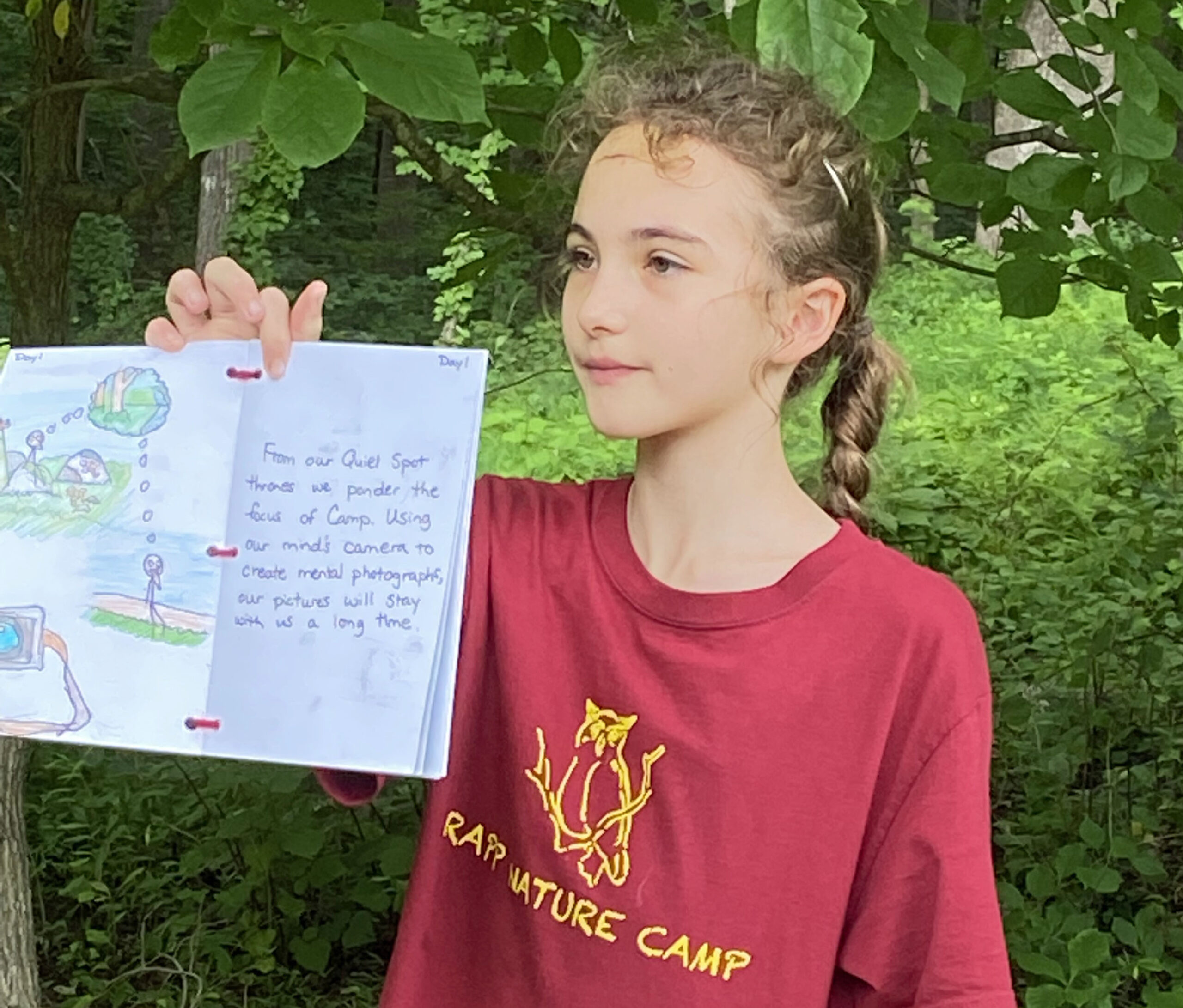“Imagination is more important than knowledge. Knowledge is limited. Imagination circles the world.” — Albert Einstein
At Rapp Nature Camp, we have discovered that “Nature lessons are life lessons.” Plants and animals, stars and clouds reveal something to us of our own nature. But this is only true if we take the time to observe living plants and animals in their own habitats. All of our natural history lessons are aimed at motivating children to observe the real things of nature in context. This kind of observation is the only means of allowing children (and all of us) to come closer to the question, “What is life?”
Language skills, living as part of a community, and “Work can be fun” are some of the life lessons gained from our time at camp. If we hear a bird singing, we might ask, “What kind of bird is that?” To answer that question, we will of course have to listen intently; then it will be perhaps not such a great leap to learn to listen–really listen–to our fellow human beings. This is a simple example of an all-important “life lesson.”
Another example is Quiet Time. Every year, we choose and make our own special individual Quiet Spots, where we spend time observing nature. No one is allowed to communicate with other campers, nor can we read books. Outside of those guidelines, campers spend Quiet Time as they choose, and later they may or may not share their observations, along with poems and drawings they may have created. This activity has very real implications related to personal freedom and sense of self. Moreover, it involves respect for our neighbors–if we don’t follow the rules by remaining quiet, this impinges on the freedom of others. We are convinced that many “life lessons” are touched upon during this one simple activity. What’s more, the campers love it!

We teach by example. We all share our experiences with the group. We write songs, play in the river, participate in all activities.
We seek to avoid indoctrination of any sort, whether it relates to religion or established scientific theories. All activities are considerate of the real needs of the child, rather than relying on any preconceived programs imposed from the outside. We try to do what is right for the times and what is right for the child–our subject matter and approach will be very different for older campers.
Two important elements of our educational program are as follows:
• The phenomenon is primary
We do not rely on books (though we occasionally consult our library) and we do not allow any electronic devices, including cameras. We are not interested in images, research or preconcieved theories. We encourage study and direct observation of the phenomena themselves. “The theory is the phenomenon.” (Goethe)
• Imagination (with a capital I)
What Goethe called “Exact sensory Imagination” is not fantasy, but a means of perception. For example, Goethe described a plant as a leaf in process of metamorphosis. The whole plant may be visualized as a leaf. The leaf changes form, then contracts into sepals, then expands into petals and so on through fruit and seed and new plants. Yet the process does not happen on a physical, sensory level; not a single leaf undergoes metamorphosis in this way. The process can only be observed Imaginatively, not in space but time.
Metaphor, song and story are some of the ways to nurture the spark of Imagination. We can imagine that we are coyotes, and learn to walk in the woods silently, with our eyes up. We can learn something about how a pattern of coloration appears on a butterfly’s wings, and we can imagine how those patterns appear to a butterfly. We can observe a cloud, and imagine how it was formed and what shape it will have five minutes from now. For the young child, Imagination is a spark that can awaken an interest and kindle a lifelong love for the living world around us.
All of the above is of course only an ideal towards which we strive. Reasonably, we only can hope to achieve it in a small way, given that our campers are here for a limited time each year. But it is our ideal, nonetheless, and we have seen that it will help our campers to come closer to the all-important question: “What is life?”
As I sit here during Quiet Time listening, I listen very closely.
What do I hear? The whisper of the trees, the talking river.
We think we have better things to do, but if you listen, you will hear a story never heard before.
The river has conversations with the breeze.
Listen for a long time and become part of the forest.
Then you will say to yourself, “I should’ve started listening a long time ago!”
–Caragh H., age 12
For further information, we recommend “Seeing Nature Whole: A Goethean Approach, ” “Educating for Sustainability: Holistic Approaches from Early Childhood through University,” and “Science Education” at natureinstitute.org